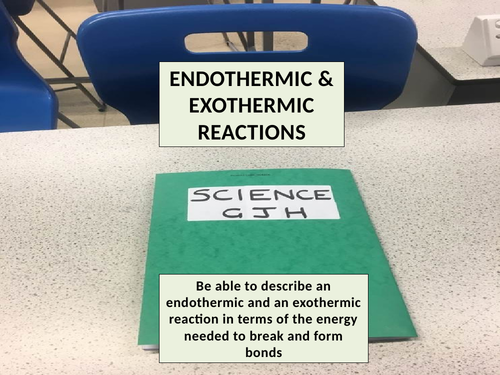




This is a fully-resourced lesson which includes an engaging and detailed lesson presentation and differentiated worksheets that together guide students through the key details of endothermic and exothermic reactions. This lesson has been designed for GCSE students but could be used with students entering this topic at A-level who are looking for a recap on the key details.
This lesson focuses on a few critical areas of these reactions and those which are often poorly understood. For example, considerable time is taken to ensure that students understand how energy is taken in to break bonds in a reaction and given out when bonds are formed. From this basis, they learn to compare the amount of energy taken in with the amount given out and ultimately determine whether it is an endothermic or exothermic reaction. The format of the lesson is that students are guided through the combustion of methane as an exothermic reaction and shown how to draw reaction profiles and calculate energy changes using the bond energies to prove it is that type of reaction. Having worked with the teacher and each other on this reaction, students are then challenged to bring their skills together to describe, explain and represent an endothermic reaction. If students feel that they will need some assistance on this task, the worksheet has been differentiated so they can still access the learning. There are a number of quick competitions written into the lesson to maintain engagement and also progress checks are found at regular intervals so students can constantly assess their understanding. The lesson finishes with a final game called The E factor which tests the students knowledge from across the whole lesson.
Get this resource as part of a bundle and save up to 36%
A bundle is a package of resources grouped together to teach a particular topic, or a series of lessons, in one place.
Topic C3: Physical chemistry (Edexcel iGCSE Chemistry)
This bundle of 12 lessons covers the majority of the content in Topic C3 (Physical chemistry) of the Edexcel iGCSE Chemistry specification. The sub-topics and specification points covered within these lessons include: [a] Energetics * Know that chemical reactions can be endothermic or exothermic reactions * Calculate the heat energy change using the expression involving specific heat capacity * Draw energy level diagrams to represent endothermic and exothermic reactions * Use bond energies to calculate the enthalpy change [b] Rates of reaction * Describe experiments to investigate the effect of changing surface area, concentration, temperature and the addition of a catalyst on the rate of reaction * Describe and explain the effects of changing surface area, concentration and temperature on a rate of reaction with reference to the collision theory * Know the definition of a catalyst and understand how it reduces the activation energy of a chemical reaction * Draw and explain reaction profile diagrams [c] Reversible reactions and equilibria * Know that some reactions are reversible * Know the characteristics of a reaction at dynamic equilibrium * Know the effect of changing either the temperature of pressure on the position of the equilibrium All of these lesson presentations and accompanying resources are detailed and engaging and contain regular progress checks to allow the students to constantly assess their understanding.
Topic C3.2: Energetics (OCR Gateway A GCSE Combined Science)
This bundle of 2 lessons covers all of the content in the sub-topic C3.2 (Energetics) of the OCR Gateway A GCSE Combined Science specification. The topics covered within these lessons include: Distinguish between endothermic and exothermic reactions Draw and label a reaction profile for both reactions Explain activation energy Calculate energy changes in a chemical reaction by considering bond making and bond breaking energies All of these lesson presentations and accompanying resources are detailed and engaging and contain regular progress checks to allow the students to constantly assess their understanding.
Topic C6: Energy changes in chemical reactions
This bundle of 2 lessons covers all of the content in Topic C6 (Energy changes in chemical reactions) of the core and supplement sections of the Cambridge iGCSE Science Double Award specification. The topics and specification points covered within these lessons include: Describe the meaning of endothermic and exothermic reactions Describe bond breaking and bond forming Labelling and interpreting energy level diagrams All of these lesson presentations and accompanying resources are detailed and engaging and contain regular progress checks to allow the students to constantly assess their understanding
Topic C7: Rates of reaction and energy changes (Edexcel GCSE Combined Science & Chemistry)
This bundle of 7 lessons covers a lot of the content in Topic C7(Rates of reaction and enrgy changes) of the Edexcel GCSE Combined Science & GCSE Chemistry specifications. The topics covered within these lessons include: Determining the rate of reaction The collision theory The effect of temperature and concentration on the rate of reaction Catalysts and the rate of reaction Endothermic and exothermic reactions Calculating energy changes in reactions All of these lesson presentations and accompanying resources are detailed and engaging and contain regular progress checks to allow the students to constantly assess their understanding.
Topic C3: Chemical reactions (OCR Gateway A GCSE Combined Science)
This bundle of 18 lessons covers all of the content in Topic C3 (Chemical reactions) of the OCR Gateway A GCSE Combined Science specification. The topics covered within these lessons include: Conservation of mass Writing word and symbol equations Writing ionic equations The mole Mole calculations Calculating masses Concentrations Endothermic and exothermic reactions Bond energy calculations Making salts Reactions of acids Oxidation and reduction reactions Electrolysis Writing half equations for electrolysis Detecting gases All of these lesson presentations and accompanying resources are detailed and engaging and contain regular progress checks to allow the students to constantly assess their understanding.
Something went wrong, please try again later.
Always look for GJHeducation as usually quality
Report this resourceto let us know if it violates our terms and conditions.
Our customer service team will review your report and will be in touch.